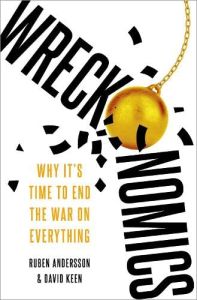Join getAbstract to access the summary!

Join getAbstract to access the summary!
Ruben Andersson and David Keen
Wreckonomics
Why It's Time to End the War on Everything
Oxford UP, 2023
What's inside?
The usual policy “wars” keep failing. Maybe it’s time for a truce.
Recommendation
War is hell, the saying goes. For professors Ruben Andersson and David Keen, the truism evokes a different kind of hellscape. In this insightful analysis, they dissect the “war on everything,” by which they mean misguided fights against problems like terror, illicit drugs and illegal immigration. In every case, the warriors oversimplify the threat, use bogus metrics to measure their progress and then duly claim victory where none exists. Andersson and Keen focus not just on the hypocrisy of political leaders but also on the unintended victims of these wars. You’ll find that their thought-provoking work casts many of society’s issues in a new light.
Summary
About the Authors
Ruben Andersson is a professor of social anthropology at the University of Oxford. He is the author of No Go World and Illegality, Inc. David Keen is a professor of conflict studies at the London School of Economics and Political Science. He is the author of The Benefits of Famine and Useful Enemies.

















Comment on this summary